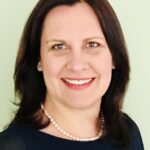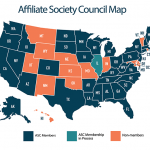On Wednesday, May 16, 2018, the ACR’s Affiliate Society Council (ASC) convened a meeting in Washington, D.C., in conjunction with the ACR’s Advocacy Leadership Conference. Despite inclement weather that delayed or cancelled numerous flights, several rheumatology representatives from states across the U.S. attended the meeting in person, while others participated by conference call.
“It was a little chaotic, at least in terms of getting people there, because of the weather,” says Joseph Cantrell, JD, the ACR’s senior manager of state affairs, but the smaller group size led to some rich outcomes. “It lent itself to more in-depth discussion about the challenges facing state societies and a broader conversation about engaging more rheumatologists in advocacy and getting them [to show] up.”
ASC meetings bring rheumatology providers together from among 42 member states to share lessons learned, work through legislative and regulatory issues at the state level, and brainstorm solutions.
“[The] ACR has the 30,000-foot view of the state level, but a lot of times, state societies have a better feel for the emerging issues we need to be paying attention to,” says Mr. Cantrell.
Issues Discussed
Among the issues discussed at the meeting were biosimilar legislation, non-medical switching, step therapy and copay accumulators.
“When patients get copay assistance cards from pharmaceutical manufacturers to help pay for a drug until they make their annual deductible, some insurers are saying that it doesn’t count toward your deductible,” Mr. Cantrell explains. “Rhode Island had a bill, and we worked in coalition to get that language removed so the copay accumulator won’t be legal.”1
Cody Wasner, a private-practice rheumatologist from Eugene, Ore., was among the providers who attended. He brought with him recent instances in his state of non-medical switching among Medicaid patients with psoriatic arthritis.
Non-medical switching describes a practice in which insurers require patients to use prescription medications that cost the insurer less money, without considering the medical needs of the patient. Sometimes this means insurers move patients off of an effective drug onto another that may not work as well or could adversely affect their health.
Dr. Wasner first learned about it from Mr. Cantrell, who had received a call about it from the National Psoriasis Foundation. The ASC also relies on relationships with other advocacy organizations, patient groups and established coalitions to learn about issues, share information and perspective, and to be most effective.
With a colleague, Dr. Wasner wrote a letter of rebuttal to submit to his state legislature. “If we hadn’t made this connection [with the ASC], we wouldn’t have been able to respond back in a scientific and powerful manner,” Dr. Wasner says. “It takes a whole network to fight against things without getting blindsided.”

